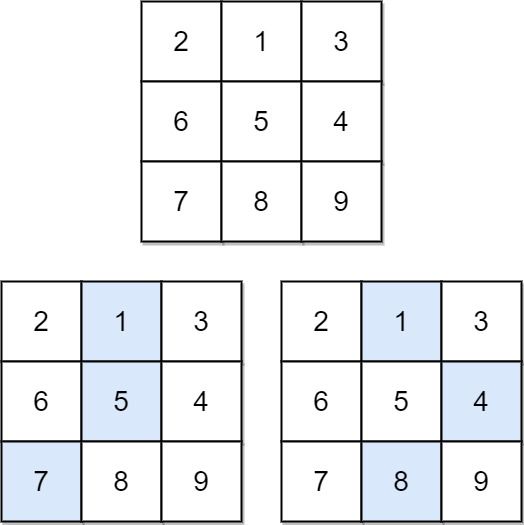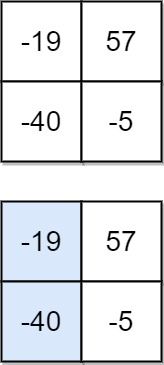Welcome to Subscribe On Youtube
931. Minimum Falling Path Sum
Description
Given an n x n array of integers matrix, return the minimum sum of any falling path through matrix.
A falling path starts at any element in the first row and chooses the element in the next row that is either directly below or diagonally left/right. Specifically, the next element from position (row, col) will be (row + 1, col - 1), (row + 1, col), or (row + 1, col + 1).
Example 1:

Input: matrix = [[2,1,3],[6,5,4],[7,8,9]] Output: 13 Explanation: There are two falling paths with a minimum sum as shown.
Example 2:

Input: matrix = [[-19,57],[-40,-5]] Output: -59 Explanation: The falling path with a minimum sum is shown.
Constraints:
n == matrix.length == matrix[i].length1 <= n <= 100-100 <= matrix[i][j] <= 100
Solutions
Dynamic programming.
-
class Solution { public int minFallingPathSum(int[][] matrix) { int n = matrix.length; var f = new int[n]; for (var row : matrix) { var g = f.clone(); for (int j = 0; j < n; ++j) { if (j > 0) { g[j] = Math.min(g[j], f[j - 1]); } if (j + 1 < n) { g[j] = Math.min(g[j], f[j + 1]); } g[j] += row[j]; } f = g; } // return Arrays.stream(f).min().getAsInt(); int ans = 1 << 30; for (int x : f) { ans = Math.min(ans, x); } return ans; } } -
class Solution { public: int minFallingPathSum(vector<vector<int>>& matrix) { int n = matrix.size(); vector<int> f(n); for (auto& row : matrix) { auto g = f; for (int j = 0; j < n; ++j) { if (j) { g[j] = min(g[j], f[j - 1]); } if (j + 1 < n) { g[j] = min(g[j], f[j + 1]); } g[j] += row[j]; } f = move(g); } return *min_element(f.begin(), f.end()); } }; -
class Solution: def minFallingPathSum(self, matrix: List[List[int]]) -> int: n = len(matrix) f = [0] * n for row in matrix: g = [0] * n for j, x in enumerate(row): l, r = max(0, j - 1), min(n, j + 2) g[j] = min(f[l:r]) + x f = g return min(f) -
func minFallingPathSum(matrix [][]int) int { n := len(matrix) f := make([]int, n) for _, row := range matrix { g := make([]int, n) copy(g, f) for j, x := range row { if j > 0 { g[j] = min(g[j], f[j-1]) } if j+1 < n { g[j] = min(g[j], f[j+1]) } g[j] += x } f = g } return slices.Min(f) } -
function minFallingPathSum(matrix: number[][]): number { const n = matrix.length; const f: number[] = new Array(n).fill(0); for (const row of matrix) { const g = f.slice(); for (let j = 0; j < n; ++j) { if (j > 0) { g[j] = Math.min(g[j], f[j - 1]); } if (j + 1 < n) { g[j] = Math.min(g[j], f[j + 1]); } g[j] += row[j]; } f.splice(0, n, ...g); } return Math.min(...f); }